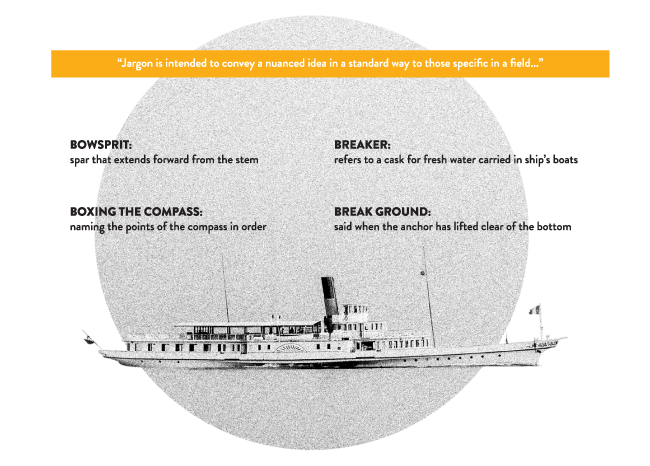
Every industry uses jargon. This specialized language can turn up in many places across the internet, and for those not well-versed in a specific field, trying to understand complex concepts can become frustrating.
While many business professionals use jargon to seem authoritative or more intelligent, it presents a significant rift in communication between the in-group and the out-group. One area that is rife with jargon is the realm of content marketing. This can be problematic because content marketers must communicate clearly with their audience. As such, it is essential to be careful when and how you use jargon.
Examples of Jargon in Content Marketing

Jargon is common in all aspects of online culture, particularly content creation, content marketing, blogging, social media marketing, and video marketing.
A few examples of jargon used in content marketing include:
- On-page optimization: on-page optimization refers to ensuring specific elements in your page’s content are optimized for the keywords you want to rank for in organic search.
- Latent semantic indexing (LSI): LSI keywords are keywords that are conceptually associated with your target keywords, as evidenced by highly recognized pages elsewhere on the internet.
- Link juice: Link juice refers to the authority and keyword signals that are passed within a website or between websites
- Domain or Page Authority: Domain Authority and Page Authority refer to the authority signals associated with a domain or webpage. In particular, the terms refer to an estimated score of authority created by Moz.
- Personas: Personas are prototypes of the ideal customer that marketers create to target these customers more strategically.
- Native advertising: This content is created to reflect the type and tone of content on the platform where it will be housed but is paid for and meant as a vector for advertising.
- Branded content: Branded content is content that is created or sponsored by a business and features the business’s brand or logo.
- Influencer marketing: Influencer marketing is a type of marketing that utilizes a person with a significant public following to market a product or service.
- Pay-per-click (PPC): Pay-per-click advertising is a system where the business pays a fee every time their advertised link is clicked on.
- Journey map: A journey map is a visualization of the steps a consumer takes in the process leading up to making a purchase.
- Marketing-qualified lead (MQL): A marketing-qualified lead is an individual that demonstrates a relatively high likelihood of becoming a future customer with proper nurturing, as shown by interaction with past marketing efforts.
- Marketing funnel: A marketing funnel is a series of stages of marketing efforts built to familiarize potential customers with your products or services gradually. It encourages them to consider your products or services over time.
Terms may also change or become obsolete over time as they reflect the changes in standards, platforms, or consumer behaviors.
Why Do People Use Jargon?

It is natural for people to develop language that reflects their unique needs in communication. Necessity is the mother of invention.
People may develop new words to describe new inventions. A common example of this is words related to advancing technology, such as recent new meanings for “tablet” or “ping”.
People also create different words relating to a concept or object that is central to their daily life to reflect important nuances. For example, a maritime culture may develop many highly nuanced words to describe characteristics of water, weather, and tidal patterns. Similarly, people may need to create new words to describe specific objects, actions, or concepts related to a unique niche they commonly interact with.
It comes down to familiarity and complexity. Jargon is intended to convey a nuanced idea in a standard way to those within a specific field – but each instance of jargon creates a communication barrier for those outside the field or industry.
The Consequences of Jargon

The regular use of jargon can have many consequences for both the in-group and the out-group. When it comes to content marketing, those consequences can include:
- Alienating potential audiences: Using jargon can reduce the understanding of clients, readers, or other audiences when explaining concepts to them. It can also make them feel alienated.
- Limitations in search: Your audience may not use jargon in their search. For example, instead of searching for “PPC campaign,” they could search for “how to run a paid ads campaign.” It’s important to vary the language in your content to target queries people are actually using.
- Failure to evolve your understanding: Concepts relevant to a particular topic or field will often naturally evolve, necessitating an evolution in your knowledge and the language. As such, regular use of outdated jargon can cause you to fall behind in your understanding and approach to a topic.
Because of these reasons, you should be strategic when considering jargon and refraining from it, especially in a content marketing campaign.
A content marketing strategy should help the reader through the buyer’s journey in your business. Carefully consider your respective target audiences when developing content around keywords they search for and topics that can earn links from other websites. Make sure to use understandable, relatable, and helpful language in the journey. In addition, consider using non-technical words and a variety of synonyms for terms to keep your content fresh and engaging. This practice will help you expand the reach of your content.
Ditching Jargon Makes You Sound Smarter

As Einstein said, “if you can’t explain it simply, you don’t understand it well enough.”
Avoiding jargon will not only pave the way for clear and accessible communication, but you will actually sound smarter if you minimize jargon. If people can understand and follow your train of thought, they can better understand the value of it.
Jargon may make you sound technically knowledgeable, but you should ditch the jargon if your goal is clear, intelligent communication.
Additionally, if you throw a bunch of jargon at someone, they may get the impression of a fast-talking car salesperson who is not sincerely invested in educating or assisting. Consider who your audience is, what your audience is looking for, and how your audience thinks.
The Time and Place for Jargon

For everything, there is a season. Jargon can and does have an appropriate time and place in content marketing.
Jargon arises from communication needs — to describe a unique or nuanced concept, a particular role, or a specialized tool. Therefore, there are cases where it is valuable to use jargon with others in your in-group to provide precise descriptions that you all understand.
Technical Writing
Technical writing is used to develop informational manuals or convey information about specialized topics between professionals. Through technical writing, content marketers can create informative articles, blogs, and guides that educate their target audience about a particular product or service and promote their brand.
In this instance, using jargon specific to that field may be appropriate or helpful. However, carefully consider your audience, what specifics they are likely to be familiar with, and whether anyone else may need to peruse the materials.
Inter-Company Communication
Many companies create internal marketing communications to help keep employees and leadership on the same page. This type of marketing can look like a newsletter sent out through email, an intranet that allows sharing of information between employees, or presentations shared in meetings.
Typically found in enterprise companies, the content marketing team prioritizes sending valuable content to employees to educate them on the business or the industry. In this scenario, jargon is acceptable because many of the employees already know the language — with the exception of new employees.
Highly Specific Information
Because jargon is developed to describe unique information, there are some cases where jargon may be the only real way to explain something accurately or nuancedly.
For example, SEO keyword research, programming, and medical terminology disciplines often utilize highly specialized terms in many areas. If you need to describe something to another person accurately, jargon may be the best way.
How to Avoid Jargon in Your Content

Avoid using jargon to create content that is understood by a broad audience. As stated before, jargon can alienate potential customers, leading them away from your site. Remember, the content you create should help turn visitors into customers by guiding them through the customer journey. To create successful content, be sure to:
- Identify and research your target audience: Understanding your target audience can help you better communicate with them. Research their pain points and how they talk about your business, and study the common phrases they use. Then, use that terminology in your content.
- Simplify your writing: When writing content, assume your audience has no idea what you’re talking about. Focus on simplifying concepts as if you were talking to a child. This way, your writing will become clear, and new website visitors will better understand what you’re offering.
- Understand what you’re writing about: If you don’t know what you’re writing about, your audience will likely not understand, either. Before you begin writing, have a deep understanding of your topic. The better you can explain it, the more straightforward your writing will be.
- Collect feedback: The more eyes you have on your writing, the more you’ll know how your content resonates with people. Before publishing, ask editors or colleagues to review your content to see if they have any questions about a concept.
Ditching jargon not only improves communication but also elevates your intelligence. By simplifying your content, you enable others to fully grasp its value and appreciate it. Embrace clear and accessible communication as it paves the way to successful content marketing.

